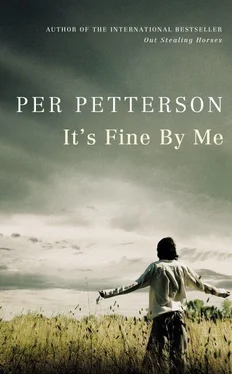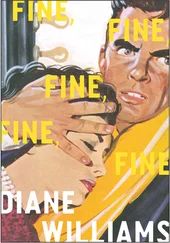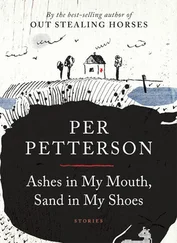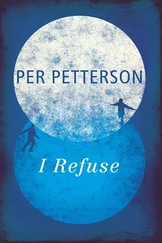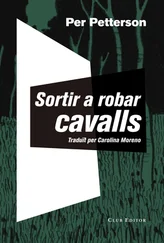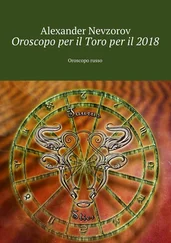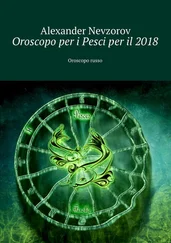The telephone call came at ten o’clock on the morning of Christmas Eve. I didn’t know if I should laugh or cry. My mother was at the kitchen worktop rubbing salt and pepper into the pork to have it ready for the afternoon. Kari was out walking with little one. Alf had been down a couple of times, but Kari did not want to go back up, not yet anyway, and my mother didn’t seem too unhappy about that. She liked being a young, active grandmother. Now we were just waiting for the next one to move in.
And then the phone rang in the hall. I pretended not to hear it, so she had to leave the kitchen, and she lifted the phone with two fingers and placed it between her chin and shoulder, flapping her hands covered with fat and spices. I could smell it from where I was sitting on the steps reading Sailor on Horseback . That’s Irving Stone’s biography of Jack London. Jack had just sold his first story to Overland Monthly . It was the hard work that won him the victory, and in that way a triumph, because it was something he could do. Work hard. His friends bought up the whole print run, but he received no more than five dollars for the story, and even I thought that was lousy pay, and then my mother went all quiet and just stood there with her hands still in the air and her mouth frozen into a half-smile, and I sat watching her instead of reading the book. I guess I knew what she was going to say before she said it. That’s how it is sometimes. She put the receiver down with the same two fingers, very carefully, her eyes shiny and blank and bewildered.
‘It’s your father, Audun,’ she said. ‘He’s dead. I can’t fathom it. They said he was found dead in a cabin up in the woods here. I don’t understand a thing, really I don’t.’
I sat perfectly still, waiting. I never told her I’d seen him, only about the accordion and where it came from, and Kari had also kept quiet. I hadn’t planned to tell her at all, but I felt sorry for my mother just then. She ran her sticky fingers through her hair, and then there were streaks of pepper and brown fat in her blonde locks.
‘You’re getting pork fat in your hair,’ I said, but she wasn’t listening, she stroked her hand across her face, and it left dark stripes on her cheek. It looked like warpaint.
‘I have to go to Aker Hospital to identify him. I could wait until after Christmas, but I’d rather do it now and get it over with. The funeral and all that will have to be sorted out. I don’t know how. You’ll come with me, Audun.’
‘No way,’ I said. She looked at me then, in her new way. I didn’t like it. I stood up, and Jack London fell and slid down the stairs, the stout photograph in black and white on the jacket knocking against the rails. The book belonged to Arvid’s father, they never ran out of stuff at their place, and I bent down to save the cover, and as I stood up, I could see how angry she was.
‘Oh yes you will!’ she said. ‘It’s your father, for God’s sake!’
‘Hell, I don’t have a father,’ I mumbled, and I meant it, but then she was towering over me, unbending and hard, and she forced me up the stairs, step by step, grabbing my hair.
‘Now we’ve both got pork in our hair,’ I said, but she was deaf in that ear.
‘I am not doing this on my own, Audun. You’re eighteen years old and a grown-up now, and you’ve seen worse. If I can do this, so can you.’
And of course she was right.
‘Fine,’ I said, ‘I’ll come with you. I can ring Arvid’s father and ask if I can borrow his car. That’d be quicker.’
‘That would be great,’ she said and let go of my hair.
I rang and told him what had happened, and he listened quietly until I had finished the story. I was starting to like the man, and then he said:
‘That’s fine, Audun. You just come and get it. I’ll leave the key in the car, so all you have to do is drive off. But forgive my asking, what’s up with you lot?’
‘I don’t know,’ I said. ‘I don’t know what’s up with us. Things just are what they are.’
‘Well, fine then, you give my regards to your mother and tell her Happy Christmas and all good wishes.’
‘Thank you,’ I said.
It’s not far to Aker Hospital. We drove ten minutes down a very quiet Trondhjemsveien, and of course it was him. I never doubted it. What my mother was thinking, I do not know, but there we were, standing in front of the steel table with his body on it, looking at the white face, and neither of us had really seen it for more than five years. We didn’t cry, and I don’t know why we should have. My mother gave the man in the white coat a nod and said yes, that is Tormod Sletten, and then she leaned over my father and stroked his hair.
‘You were a stylish man. No one can take that away from you,’ she said, and turning to me, she said, ‘You’re starting to look like him, Audun, but of course, you’ve got my hair. There’s no denying that.’ She smiled and stroked my hair, too, and my cheek, and then it got a little awkward. Luckily she started talking to the white coat about the funeral, he could arrange it for the 29 thhe said, and I made for the wall and leaned against it and looked over at the table in the middle of the tiled floor. He was different now, his hair was grey, almost white, and his face was white, smooth even, and the furrows down his cheeks were not so distinct. Maybe they have done something to him, I thought, and carefully passed my hand over my own face.
As we left they gave us a bag with his personal effects. ‘We had to confiscate the gun,’ the doctor said. ‘We searched through his things, but couldn’t find a licence for it.’
‘That’s fine by me,’ my mother said. She gave me the bag, and we walked along the corridors. We could hear our footsteps between the walls the whole way down, and there were red and green Christmas decorations hanging from every lamp, and on the door out there was a huge wreath with a bell. Back behind the wheel, I opened the bag and looked into it. There wasn’t much: his knife, a few keys he had kept for long-forgotten doors, two fifty-kroner notes and a small black and white photograph. I picked it up, and the woman in it, I had never seen before. She had short, black hair and was sitting on a rock by a lake, maybe Aurtjern, the bay seemed familiar to me. Marianne it said on the back in his messy handwriting. I sat looking at the name, and then it came all the way back to me.
‘Marana,’ I said.
My mother leaned over the handbrake to study the photograph.
‘Well, I never, that’s Marianne Røkken,’ she said. ‘She was in my class at school. We were friends for a few years. She too fell in love with your father. I remember well when that photo was taken, because I was the one who took it. Fancy him carrying it around. That man!’ She shook her head, and I looked more closely at the photo and realised it was the clothes that made her seem like a woman . She was probably no older than I am now. And it struck me that there were things in my mother’s and father’s lives that I would never get to know.
It was a strange Christmas Eve. When we came back from Aker Hospital, Kari was in the kitchen talking to Roberto. He had stopped by with presents and silly jokes, singing arias, and had just started a rendering of ‘Jerusalem’ that was the worst I had ever heard. He was making more noise than the four of us put together. I drew Kari aside and told her what had happened, and we agreed not to tell what we’d known the last few months. There was enough going on already.
At last the roast pork was in the oven. The aroma spread slowly up to the first floor and mingled with the sauerkraut and the burning candle wax, and the dead man’s name was never mentioned. At three o’clock I watched Disney’s Christmas programme as I always do.
Читать дальше
